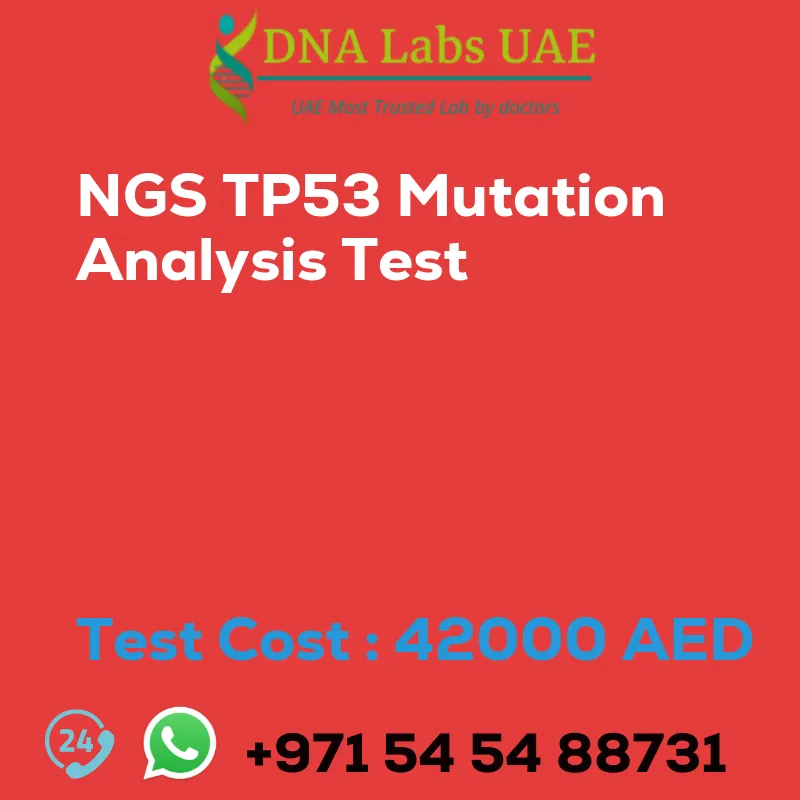NGS TP53 Mutation Analysis Test
Introduction
Welcome to DNA Labs UAE, a leading genetic laboratory offering advanced molecular diagnostic tests. In this blog, we will discuss the NGS TP53 mutation analysis test, its cost, symptoms, diagnosis, and other important details.
Test Name: NGS TP53 Mutation Analysis Test
Components:
- EDTA Vacutainer (2ml)
Price: 42000.0 AED
Sample Condition: Bone marrow / Peripheral blood (Transport immediately)
Report Delivery: 15-18 days
Method: NGS (Next-Generation Sequencing)
Test Type: Genetics
Doctor: General Physician
Test Department:
Pre Test Information
NGS TP53 mutation analysis can be done with a doctor’s prescription. However, please note that the prescription is not applicable for surgery and pregnancy cases or individuals planning to travel abroad.
Test Details
NGS TP53 mutation analysis is a molecular diagnostic test that utilizes next-generation sequencing (NGS) technology to identify mutations in the TP53 gene. TP53 is a tumor suppressor gene that plays a vital role in preventing the development of cancer. Mutations in TP53 are associated with various types of cancer, including breast cancer, ovarian cancer, lung cancer, and colorectal cancer.
NGS TP53 mutation analysis involves sequencing the entire TP53 gene or specific regions of the gene to detect any mutations or variations. The test can identify single nucleotide variants (SNVs), insertions, deletions, and copy number variations (CNVs) in the TP53 gene.
This test is typically performed on tumor tissue samples from patients with suspected or confirmed cancer. The results of the test provide valuable information for treatment decisions and prognosis. Certain TP53 mutations are linked to a poorer response to chemotherapy and a higher risk of cancer recurrence.
Overall, NGS TP53 mutation analysis is a powerful tool for identifying TP53 mutations in cancer patients. It significantly improves the accuracy of cancer diagnosis and treatment.
Conclusion
The NGS TP53 mutation analysis test offered by DNA Labs UAE is an advanced molecular diagnostic test that detects mutations in the TP53 gene. It plays a crucial role in the diagnosis and treatment of various types of cancer. With a report delivery time of 15-18 days, this test provides valuable information for treatment decisions and prognosis. If you suspect or have confirmed cancer, consult a general physician to get a prescription for the NGS TP53 mutation analysis test.
| Test Name | NGS TP53 mutation analysis Test |
|---|---|
| Components | EDTA Vacutainer (2ml) |
| Price | 42000.0 AED |
| Sample Condition | Bone marrow \/ Peripheral blood (Transport immediately) |
| Report Delivery | 15-18 days |
| Method | NGS |
| Test type | Genetics |
| Doctor | General Physician |
| Test Department: | |
| Pre Test Information | NGS TP53 mutation analysis can be done with a Doctors prescription. Prescription is not applicable for surgery and pregnancy cases or people planing to travel abroad. |
| Test Details |
NGS TP53 mutation analysis is a molecular diagnostic test that uses next-generation sequencing (NGS) technology to detect mutations in the TP53 gene. TP53 is a tumor suppressor gene that plays a crucial role in preventing the development of cancer. Mutations in TP53 are associated with a wide range of cancers, including breast cancer, ovarian cancer, lung cancer, and colorectal cancer. NGS TP53 mutation analysis involves sequencing the entire TP53 gene or specific regions of the gene to identify any mutations or variations that may be present. The test can detect single nucleotide variants (SNVs), insertions, deletions, and copy number variations (CNVs) in the TP53 gene. NGS TP53 mutation analysis is typically performed on tumor tissue samples from patients with suspected or confirmed cancer. The results of the test can help guide treatment decisions and provide valuable information about a patient’s prognosis. For example, certain TP53 mutations are associated with a poorer response to chemotherapy and a higher risk of cancer recurrence. Overall, NGS TP53 mutation analysis is a powerful tool for identifying TP53 mutations in cancer patients and can help improve the accuracy of cancer diagnosis and treatment. |







